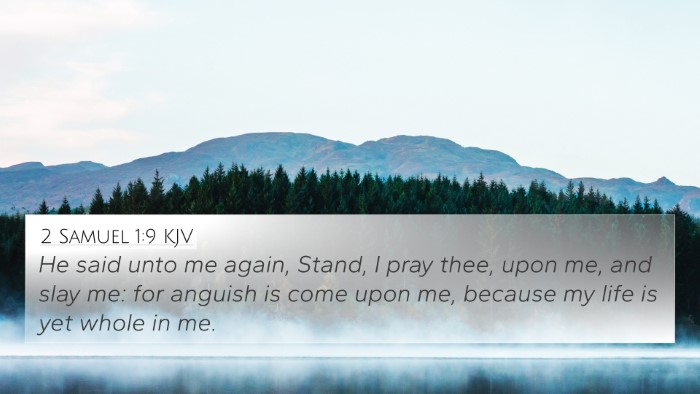Understanding Revelation 9:6
Revelation 9:6 states, "And in those days men shall seek death, and shall not find it; and shall desire to die, and death shall flee from them." This verse captures the profound despair and torment experienced by humanity during the apocalyptic events described in the Book of Revelation. It reveals the nature of suffering that transcends physical pain, highlighting a spiritual and emotional anguish that leads men to seek relief in death, only to find it elusive.
Contextual Analysis
The context of Revelation 9 depicts the fifth trumpet judgment, where locust-like creatures torment those without the seal of God. Their suffering is so intense that it drives them to the brink of death, illustrating the divine judgment that ensues in the last days. This suffering accompanies the vivid imagery found throughout Revelation, symbolizing the ultimate consequences of sin and rebellion against God.
Insights from Public Domain Commentaries
Matthew Henry's Commentary
Matthew Henry points out that the inability to find death during this time signifies a profound judgment from God. The torment that lasts five months is designed to lead people to repentance, yet they remain obstinate in their rebellion. This depiction serves to emphasize the severity of divine retribution that prevents even the release of death.
Albert Barnes' Notes
Albert Barnes elaborates on the idea that the desire for death reflects the hopelessness of those afflicted. The torment is not just physical but spiritual, where people yearn for the end of their suffering, yet are met with despair. This passage underscores the theme of God's judgment whereby life becomes a torment rather than a blessing.
Adam Clarke's Commentary
Adam Clarke emphasizes the metaphorical significance of death fleeing from individuals, suggesting that in times of judgment, even death can seem like a prize that is withheld from humanity. This signifies a profound spiritual battle, where the hope of despair becomes a significant element of the human condition during apocalyptic tribulations.
Bible Cross-References
This verse correlates with several other biblical texts that illuminate its meaning:
- Job 3:20-22 - Expresses lament over life amidst suffering.
- Luke 23:30 - A prophecy of a desire for death during tribulation.
- Jeremiah 8:3 - A similar expression of anguish and desire for death amidst suffering.
- Revelation 6:16 - Highlighting people seeking to hide from divine wrath.
- Isaiah 57:1-2 - Suggests the righteous are taken from distress, while the wicked endure torment.
- Matthew 24:22 - For the sake of the elect, those days will be shortened, indicating severe trials.
- Revelation 16:10-11 - Describes the blasphemies of those who suffer, wishing for death.
Thematic Connections
This verse highlights specific themes in Scripture such as divine judgment, human despair, and the elusiveness of death. It encourages readers to reflect on the broader themes of suffering and hope found throughout the Bible.
Further Reflections on the Meaning of Revelation 9:6
The desire for death, yet its unavailability, mirrors the condition of sin within humanity. This passage invokes a profound reflection on human existence in the face of judgment and the complexities of divine mercy intertwined with justice. Each of these cross-references serves to deepen the understanding, presenting a tapestry of biblical connections that echo the same themes of anguish and longing for relief:
Connections Between Bible Verses
Identifying connections between Revelation 9:6 and other verses provides a richer interpretation. For example:
- **Job's lament** in Job 3 connects to the desire for release from suffering.
- **Christ's words in Luke**, where people acknowledge the reality of one seeking escape from tribulations.
Conclusion
In summary, Revelation 9:6 serves as a potent reminder of the trials that humanity faces as a result of divine judgment, emphasizing the depths of despair that can arise in times of great distress. The cross-references and insights from public domain commentaries provide a comprehensive understanding of its meaning and relevance within the wider biblical narrative.
Tools for Bible Cross-Referencing
For those seeking to explore further, effective tools for Bible cross-referencing include:
- Bible concordance
- Cross-reference Bible study guides
- Comprehensive Bible study applications











